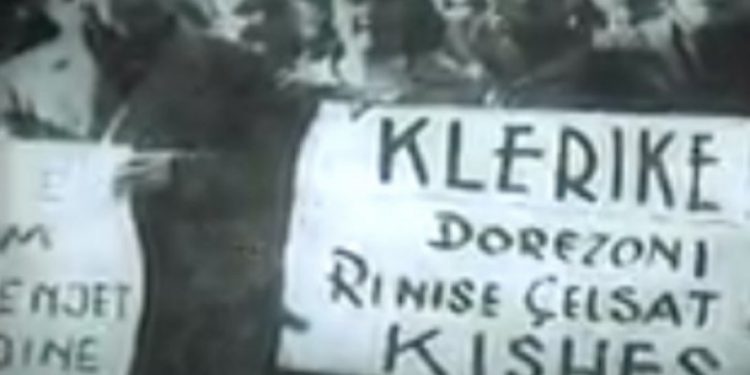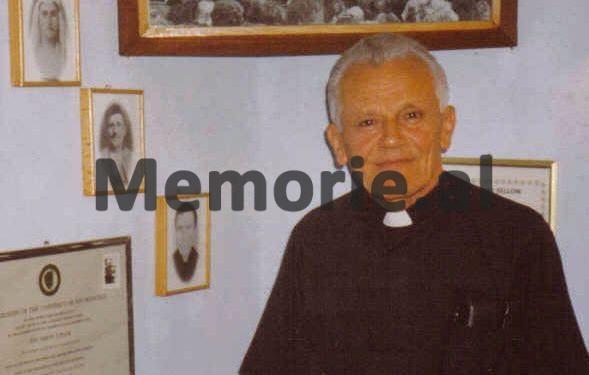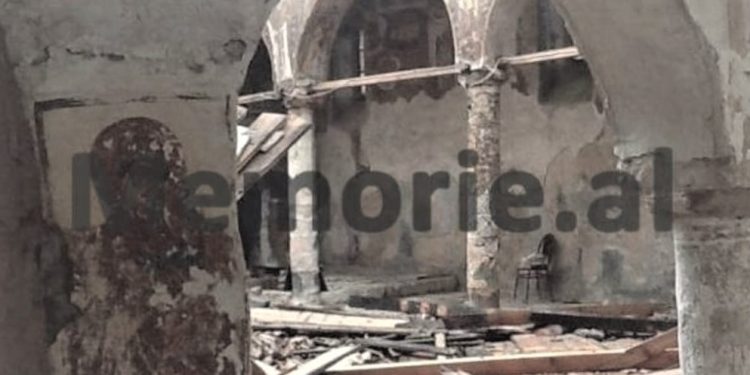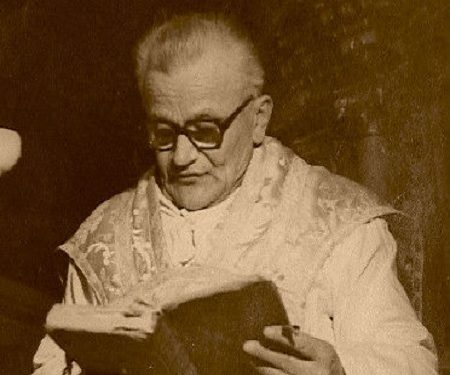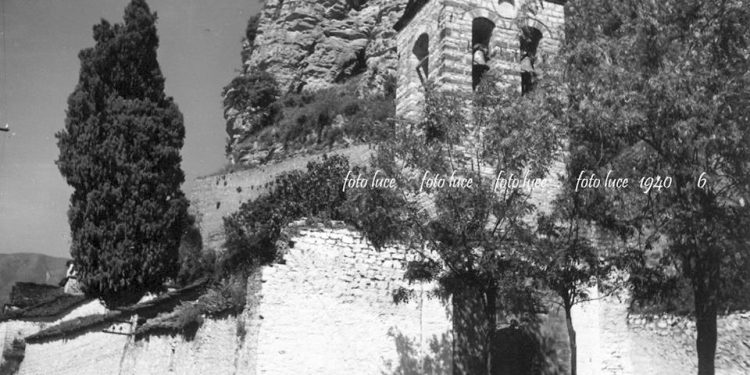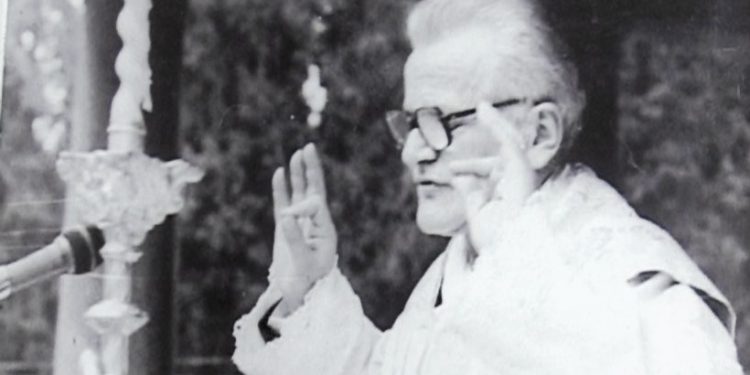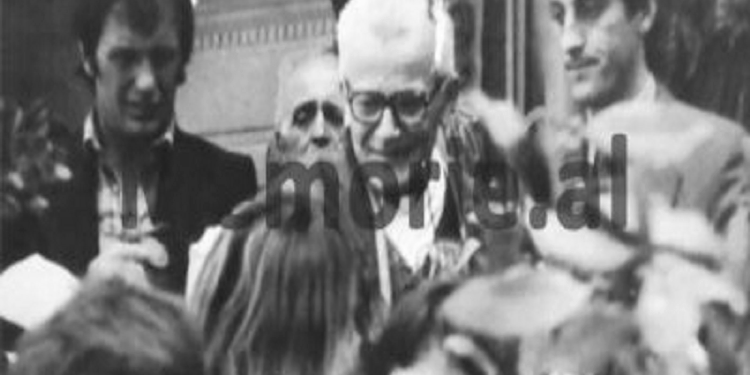By Dom Simon Jubani
The first part
Memorie.al / Simon Jubani were born in Shkodër in 1927. At the age of 16, he entered the Apostolic School to become a Jesuit priest. After the closing of the Catholic religious schools in 1945 – ’46, he continued his studies at the state gymnasium in the city of Shkodra, where he excelled as a football player with the “Vllaznia” team. He then moved to Tirana, where he completed a radio-x-ray course and worked for a while at the capital’s Military Hospital, after being mobilized for mandatory military service. At the end of three years, he returned to Shkodër, where he presented himself to Monsignor Ernest Çoba and begged him to ordain him a priest, but he advised him to wait and so he was forced to resume work as a radiologist at the Shkodra Sanatorium. In 1957-58 he received the “Orders of the Priesthood” and served in the district of Mirdita as a parish priest. At that time he was arrested by the State Security and convicted and sentenced several times during his sentence, such as in Spaç, Qafë Bari, Ballsh, Burrel and Zejmen, where he served a total of 26 years in prison. Dom Simoni, who is known by all his fellow sufferers for his dignified and uncompromising stand with the communist regime, was released from prison on April 13, 1989. On November 4, 1990, the chapel of the Rrmaji cemetery was burned. , he celebrated the first public Catholic mass, in front of hundreds of believers, which had been forbidden by law by the communist regime of Enveri Hoxha, since 1967. For his contribution, in 1991, the University of San Francisco in California awarded him the degree “Doctor Honoris Causa” in Human Sciences. While in 1996, the state of Michigan honored him with a diploma with the motivation: “Initiator of freedom of speech and the Catholic press”. Dom Simon Jubani is the first Albanian, after the fall of communism, to be called to audience by Pope John Paul II. Dom Simon Jubani passed away on July 12, 2011, in the city of Shkodra and was buried with many special honors in the Rrmaji Cemetery Chapel, by all the heads of religious communities, by the highest civil authorities and many believers. Dom Simoni is the author of two books of memoirs, mainly about the period of serving sentences in camps and prisons, parts of which we have selected and are publishing in this article.
COMEDY HOUR
Don’t think that everything was a tragedy in prison. Wherever and however a person is, in his life, close to tragedy, there is always something chronic. So even in prison, many people suffered from an inferiority complex.
You never read a single line in their lives, they had moments when, in order to be equal to the cultured people, with whom they sat all day in the same sardine box, they began to remember book titles and quote authors, who did not even in the dream they did not see them.
They also distorted their names and words, so much so that it was impossible not to laugh at me. Then they started writing books. And, as they had done, they gave it to me; you hoped that you would rank it among the greatest authors of world literature, of course somewhere between Shakespeare and Moliere!
The writings were like two drops of water to the authors. They had here and there some pearls, stolen from the world’s treasures and, onions with prison twine in the lines of writing. As I removed these ornaments, the work sounded like a bad high school student’s composition.
I would tell them this and they would get angry. They remembered that I hated them out of envy and that their works, when they got out of prison, would shine in the windows of the world’s bookstores, where, perhaps, that part of the tragedy that has been suppressed, is sold at half price, because people fed up with the West, they don’t like stories of martyrdom.
Neither before nor after bread! To one, when I read his masterpiece, I was told that it was below the intellectual level of Skanderbeg’s horse! Another, that he lived only for the hangar! Pjetri told me that operative, he did not read the letters of the villagers, because, being a villager himself, he did not understand their arguments. But the villager with thick opanga, their minds were as good as thin ones.
I am citing only this example: a friend of mine from Bushati, one day received a letter from his wife. Among other things, he wrote: “You are a hundred times better than me, there in prison, because those 600 grams of bread full of dirt, pebbles and other garbage, that fall into your beak without a second, I need more You won to work as a joke, in the rain and in the sun, you made me sweat.
You rest all day there in the dungeon, while I long for a day off, because even on Sundays, they take our souls away with endless work and conferences”.
Such an affirmation without measure. They told me that, those who were called free, they were greedy for us, who were in chains Beauty. Such a comedy suited us perfectly, even though it completely nullified the threats of the prison director, who, among other things, told us: “Behave well, otherwise I will send the family from the cooperative to concentration camp and, in the following, he misbehaved, even in the prison dungeon”.
The letter from Bushati told us that this staircase led to the rain in Parriz, where we had arrived a long time ago. Other sources of creativity for our comedies were the press and radio. They started with the newspaper “Voice of Youth” which had taken upon itself to solve the problems of young people.
We then continued to read, according to our way, the other press bodies:
Imprisoned I: They accuse us of not having cars!
Imprisoned II: Why do we need cars, who love each other so much that we like to travel together, collectively, between buses, and even more like to travel in open cars, in trucks, because that’s how we saturate not only with each other, but also with air?
Imprisoned III: While those who live in the west do not love each other. Therefore, they each travel on their own account, in personal cars. Then, the poor spend the whole day in the queues of shops, to buy prases or leek imported from Albania.
Imprisoned I: People there do nothing but search among the trash…! Sometimes I couldn’t help myself, I went outside the text. One day I said to the director: “Why don’t you also send us, for punishment, to the capitalist world? What do your newspapers write about, we suffered worse there than in Burrel”!
In such cases, the curtain of tragedy opened for me. Because, my lord, we should never forget the proverbs of the people, which says that excessive gas often produces oil, and moreover, it adds: “the mouth is swollen and the back is sore”! After this kind of gas, the tortures began for me, until I ended up like the Phoenix: ashes and dust.
But when the sly door of the dungeon opened again, to sweep me away, like the Mythological Bird, I was taken anew on the dusty stool, ready for a new comedy! The secret? Prayer, sir. It was what gave me life, when even the last physical forces had abandoned me!
Believe with all your heart and pray, you have seen how a person turns into a Phoenix! Even in something more divine: in a dead person, who is resurrected on the third day, to ascend from there among the upper circles, where there are no more prisons or shackles!
Another source for comedy was the radio, which served to educate us, because the prison itself was called the “Re-education Ward”.
Thus, the word “prison” disappeared from the dictionary and the world could not complain that Albania had prisons, and even more so because there was not a single inch of this land, where there were not open pits, for the bone and skin bodies of prisoners and internees, who are the real martyrs of the fight for freedom.
In order to reeducate us, they took the loudspeaker of Radio-Tirana to the sky, from which we were lucky enough to hear the funniest news of our lives. The first scene of what we were eagerly waiting for was the news that Mehmet Shehu, after a severe nervous crisis, had killed himself. The climax of the comedy arrived with the death of Enver Hoxha.
The gas that produced this peak must be recorded in the world annals of gas history, because there is no other comedy that has caused a more furious, more terrible, more humiliating gas than the one that exploded in the dungeons of the prison.
I still hear the ghost of my friend of misery, the late Ded Begeja, who towered over everyone else, in a frenzy of joy.
Even in the face of the policeman, who opened the counter when he saw what was happening, it was read that he was ready to burst the gas, because he was also a slave in a way, like us.
He took care of us, because it was easier than taking care of the cooperative’s fields. He often ate bread with walnuts in front of us, which his wife had stolen from among the orchards of the cooperative.
I was having fun, so I made fun of the policemen, to whom, when I was having a good time, I said: “I’m fine, I’m sitting here because I speak and I’m against communism and communists, what crime did you commit, that they punished you more severely 12 hours straight?
And when your mother takes you, eat worse than me, a piece of bread made of stone and wood with nuts or tomato stolen from your women in the cooperative. What’s wrong with me, you cuckoos: I’m sentenced to temporary imprisonment and you to life imprisonment”!
Among dictatorial regimes, the one who rebels, whose life does not suffer, lives better than anyone else. The others, from the most important, to the last servant of the dictator, all live in anxiety, not knowing who they have friend and who enemy, you wait when the tripod is being raised and the ornament is being prepared.
And of course, he never thought of taking part in the comedies that we played with all our zeal and fun, in the prison dungeons. Because, cuckoos, they die on the scene of the tragedy.
Another scene of the dungeon comedy opens when the prison inspectors come from Tirana. All the roommates kept their eyes on me, to cheer me up, because you never knew what the unwanted friends would do. Then I was ready to vent, so as not to crack. Those who came from Tirana wore the Sunday costume on this occasion.
The first to walk with skulls, followed by the caravan of Burrell authorities in military uniforms. The doorbells rattled, the doors creaked open, and the guests appeared in their frames with frowning faces, because the official noses immediately collided without a trace of respect, the smell coming from our dirty clothes and especially from the pipes in the corner of the room, full with the productions of random emotions.
In a scene filled with aromas like this, the great one from Tirana took the floor in front of 30 zelans, wrapped in Stalin’s quilt, I mean, like rare malotas, because they are filled with bad cotton, which for the euphonium they wear fur. “We also came for legal advice. Therefore, if anyone has any complaints, if any injustice is done to them, we are ready to listen to them”!
The 30 zelanas looked with eyes ready to be extinguished at what had come to become a god. Among the pelts and furs lay the terrible, unfathomable graves of the inquisitor, who rang as a warning. No, they had no complaints, no rights had been violated! They can be chaste.
And how could their rights is violated, at a time when they did not enjoy any rights? Then they fixed their eyes on Dom Simon, as if they wanted to say: “Speak, then, you for us”! Of course, the church had no way to respond to those eyes, which were looking for freedom precisely in the words of the priest, who for them represented Christ.
Then, I took them and started the big litanies: “You are here talking to us about laws. For what laws? Written or unwritten? That here we are treated according to unwritten laws, that this is not a prison, but an institution of extermination, that it is not at all difficult to understand, that we live below the level of animals…”!
Of course, I never got around to finishing the litanies, because that friend, who had come to defend justice and bind me in irons, gave the order to make me dance. So the prison comedy, for me and for many, always had a tragic end! Memorie.al
The next issue follows




